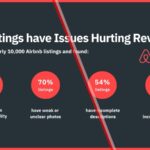Vrbo Adds New Accessibility Filters to Help Travelers With Disabilities With Rentable
- Vrbo has rolled out a new suite of accessibility features aimed at helping travelers with disabilities find more suitable stays.
- Guests can now filter properties by specific accessibility attributes such as entrance ramps, stair-free paths, accessible parking, and pools with handrails.
- According to Becoming rentABLE, only 0.1% of STRs are currently listed as accessible, despite travelers with mobility challenges spending an estimated $60 billion annually on travel.
- To support the rollout, Vrbo has partnered with Becoming rentABLE, a platform that specializes in accessible short-term rentals.
- Vrbo and Becoming rentABLE are offering hosts a free, 10-minute online training with practical tips on adding or showcasing accessibility features—no certification or prior expertise needed.
Snigdha’s Views
- There’s a big gap between what travelers with accessibility needs are looking for and what most short-term rentals currently offer — and Vrbo aims to close that.
- Vrbo is clearly recognizing a real opportunity here. Guests with disabilities represent a large and often overlooked market, and many listings may already meet some of their needs; they just don’t show it clearly.
- The training from Becoming rentABLE is just 10 minutes long but packed with clear, actionable ideas. It helps hosts see that accessibility doesn’t require a full remodel—just a few thoughtful upgrades that can open their listings to a wider, often overlooked guest segment.
- If Vrbo starts factoring accessibility into search visibility, these updates could also help listings stand out.
- For property managers, this is a good time to take stock — update your listing details, check what small changes might help, and see if there’s more you can offer than you realized.
Oyo-Owned Belvilla Acquires Australia’s MadeComfy to Expand in Oceania
- Oyo-owned Belvilla has acquired MadeComfy, an Australian short-term rental management company managing over 1,200 properties across major cities in Australia and New Zealand.
- MadeComfy’s core model is managing properties for investors — complements Belvilla’s full-service approach and expands Oyo’s reach in Oceania, one of the world’s most active vacation rental markets.
- Oyo is paying for MadeComfy with a mix of shares and cash: $1.9M in shares now, $9.6M in shares later (likely tied to performance), plus an undisclosed cash amount.
Snigdha’s Views
- Oyo has followed a clear pattern: acquire regional leaders, integrate them, and scale a unified model.
- We’ve seen this before: after the 2019 acquisition of the Leisure Group (which added 50,000 European homes), Oyo picked up Croatia’s Direct Booker, Denmark’s Bornholmske Feriehuse, France’s Checkmyguest, and the U.S.-based Motel 6.
- For STR managers in Australia, this deal could also trigger new homeowner expectations. With MadeComfy now backed by a global brand, local owners may demand the same level of tech, support, and earnings.
- Now’s the time to sharpen your value proposition. Owners will be comparing — make sure your offer stands out.
Spain Proposes 21% VAT on Short-Term Rentals, While Hotels Remain at 10%
- Spain is proposing a 21% value-added tax (VAT) on short-term tourist rentals under 30 days, a significant increase from the 10% VAT currently applied to hotel stays.
- The change would end the VAT exemption that short-term rentals currently enjoy in mainland Spain.
- If approved, this new measure could impact roughly one-third of Spain’s 94 million annual tourists, those who choose vacation homes over hotels.
- The proposal is part of a broader housing bill aimed at addressing affordability and curbing the use of residential properties exclusively for tourism.
- The bill also proposes taxing non-EU buyers up to 100% on non-primary residences and raising taxes on vacant or second homes.
- Apartur, which represents Barcelona’s tourist apartments, insists STRs should be taxed like hotels, not penalized with a “discriminatory” 21% VAT.
- The government lacks a parliamentary majority, making it unclear whether the proposed measures will pass.
Snigdha’s Views
- This new VAT proposal comes right on the heels of Spain ordering Airbnb to delist nearly 66,000 unregistered listings — a clear sign that the pressure on Spanish STRs is escalating fast.
- A 21% VAT could tilt the playing field in favor of hotels, which would still be taxed at a lower 10%. That’s not just a financial burden on STR operators, it also risks reducing traveler choice by making vacation rentals less favourable.
- If passed, this policy would reshape the economics of short-term rentals in Spain. For property managers, this is a flashing red warning light. Get fully licensed, prepare for rising costs, and advocate strongly.
- Because the proposed VAT only applies to stays under 30 days, managers may want to explore mid-term rental models as a potential hedge.
Snigdha Parghan is a Content Marketer at RSU by PriceLabs, where she creates articles, manages daily social media, and repurposes news and analysis into podcasts and video content for short-term rental professionals. With a focus on technology, operations, and marketing, Snigdha helps property managers stay informed and adapt to industry shifts.







